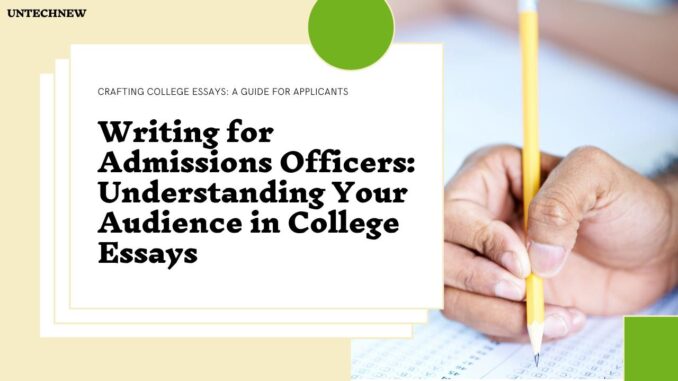
In the competitive realm of college admissions, the college essay serves as a crucial tool for applicants to communicate their personalities, experiences, and aspirations to admissions officers. However, crafting a compelling essay requires more than just eloquent prose and polished writing—it demands a deep understanding of the audience: the admissions officers who will be reading and evaluating your essay. In this article, we’ll explore the importance of understanding your audience in college essays and offer insights into how applicants can tailor their writing to resonate with admissions officers effectively.
The Role of Admissions Officers
Before diving into the intricacies of crafting a college essay, it’s essential to understand the role of admissions officers. Admissions officers are tasked with the challenging responsibility of reviewing thousands of applications and identifying candidates who not only demonstrate academic prowess but also possess the qualities and characteristics that align with the values and mission of the institution. They seek applicants who are intellectually curious, socially engaged, and poised to make meaningful contributions to the campus community.
Understanding What Admissions Officers Are Looking For
To effectively engage with admissions officers through your essay, it’s crucial to understand what they are looking for in applicants. While every institution may have its unique criteria, there are several common qualities and attributes that admissions officers tend to value:
- Authenticity: Admissions officers seek genuine and authentic portrayals of applicants’ personalities, experiences, and aspirations. They value honesty and sincerity in applicants’ writing, looking for essays that reflect applicants’ true selves rather than contrived personas.
- Intellectual Curiosity: Admissions officers are drawn to applicants who demonstrate a genuine passion for learning and intellectual exploration. They look for evidence of intellectual curiosity, critical thinking skills, and a willingness to engage with complex ideas and concepts.
- Character and Integrity: Admissions officers seek applicants with strong moral character, integrity, and ethical values. They value individuals who demonstrate integrity in their actions, empathy for others, and a commitment to making ethical decisions.
- Resilience and Perseverance: Admissions officers are impressed by applicants who have overcome adversity, setbacks, or challenges with resilience and perseverance. They value individuals who demonstrate grit, determination, and the ability to thrive in the face of obstacles.
- Contribution to the Community: Admissions officers seek applicants who are not only academically talented but also socially engaged and committed to making a positive impact on their communities. They value individuals who have demonstrated leadership, service, and involvement in extracurricular activities or community service projects.
Tailoring Your Writing to Resonate with Admissions Officers
Armed with an understanding of what admissions officers are looking for, applicants can tailor their writing to resonate with this audience effectively. Here are some strategies for writing compelling college essays that capture the attention of admissions officers:
- Be Genuine and Authentic: Authenticity is key to connecting with admissions officers. Be genuine in your writing, sharing your true thoughts, emotions, and experiences. Avoid exaggeration, embellishment, or attempts to impress with insincere language.
- Showcase Intellectual Curiosity: Demonstrate your intellectual curiosity and passion for learning through your essay. Share insights into your academic interests, research projects, or independent studies that highlight your enthusiasm for knowledge and discovery.
- Highlight Character and Integrity: Reflect on moments in your life that illustrate your character, integrity, and ethical values. Share stories of integrity, honesty, and moral courage that demonstrate your commitment to doing what is right, even when faced with difficult choices.
- Illustrate Resilience and Perseverance: Share stories of resilience and perseverance that showcase your ability to overcome challenges and setbacks. Reflect on how you have grown and learned from adversity, demonstrating your resilience and determination to succeed.
- Articulate Your Contribution to the Community: Highlight your contributions to your school, local community, or broader society. Share stories of leadership, service, or involvement in extracurricular activities or community service projects that demonstrate your commitment to making a positive impact on the world around you.
Crafting a Compelling Narrative
In addition to understanding the audience and tailoring your writing accordingly, crafting a compelling narrative is essential to engaging admissions officers through your essay. A compelling narrative captivates readers’ attention, evokes emotion, and leaves a lasting impression. Here are some tips for crafting a compelling narrative in your college essay:
- Start with a Hook: Begin your essay with a compelling hook—a captivating opening line or anecdote that grabs readers’ attention and draws them into your story.
- Show, Don’t Tell: Use descriptive language, vivid imagery, and sensory details to bring your experiences to life on the page. Show admissions officers your story through compelling storytelling rather than simply telling them about it.
- Provide Context and Reflection: Provide context for your experiences and reflect on their significance in your life. Share insights, lessons learned, and moments of personal growth that demonstrate your self-awareness and maturity.
- Maintain a Clear Structure: Organize your essay with a clear structure that guides readers through your narrative. Use transitions and signposts to connect ideas and ensure coherence and flow.
- End with a Conclusion: Conclude your essay with a thoughtful reflection or takeaway message that leaves a lasting impression on readers. Tie together the themes and insights of your essay, leaving admissions officers with a sense of closure and resonance.
Conclusion
Understanding your audience—admissions officers—and tailoring your writing to resonate with them is essential to crafting a compelling college essay. By showcasing authenticity, intellectual curiosity, character, resilience, and contributions to the community, applicants can capture the attention of admissions officers and leave a lasting impression. By crafting a compelling narrative that engages readers’ attention, evokes emotion, and leaves a lasting impression, applicants can increase their chances of standing out in the competitive college admissions process. So, take the time to understand your audience, reflect on your experiences, and craft an essay that showcases the essence of who you are as a person and a student.

Leave a Reply